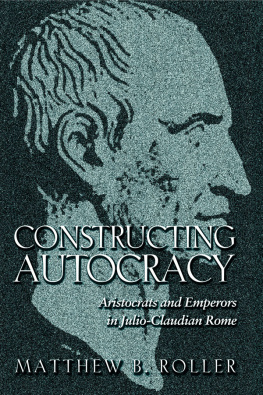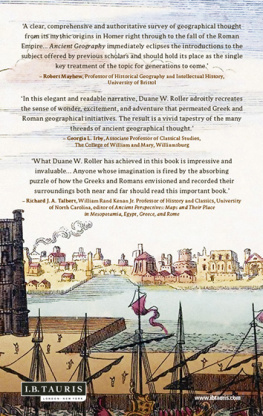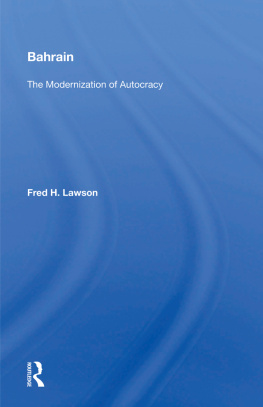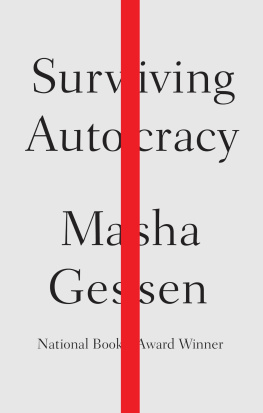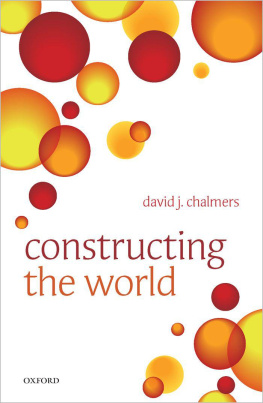Roller - Constructing Autocracy
Here you can read online Roller - Constructing Autocracy full text of the book (entire story) in english for free. Download pdf and epub, get meaning, cover and reviews about this ebook. year: 2001;2015, publisher: Princeton University Press, genre: Romance novel. Description of the work, (preface) as well as reviews are available. Best literature library LitArk.com created for fans of good reading and offers a wide selection of genres:
Romance novel
Science fiction
Adventure
Detective
Science
History
Home and family
Prose
Art
Politics
Computer
Non-fiction
Religion
Business
Children
Humor
Choose a favorite category and find really read worthwhile books. Enjoy immersion in the world of imagination, feel the emotions of the characters or learn something new for yourself, make an fascinating discovery.
- Book:Constructing Autocracy
- Author:
- Publisher:Princeton University Press
- Genre:
- Year:2001;2015
- Rating:4 / 5
- Favourites:Add to favourites
- Your mark:
- 80
- 1
- 2
- 3
- 4
- 5
Constructing Autocracy: summary, description and annotation
We offer to read an annotation, description, summary or preface (depends on what the author of the book "Constructing Autocracy" wrote himself). If you haven't found the necessary information about the book — write in the comments, we will try to find it.
Roller: author's other books
Who wrote Constructing Autocracy? Find out the surname, the name of the author of the book and a list of all author's works by series.
Constructing Autocracy — read online for free the complete book (whole text) full work
Below is the text of the book, divided by pages. System saving the place of the last page read, allows you to conveniently read the book "Constructing Autocracy" online for free, without having to search again every time where you left off. Put a bookmark, and you can go to the page where you finished reading at any time.
Font size:
Interval:
Bookmark:

CONSTRUCTING AUTOCRACY
CONSTRUCTING AUTOCRACY
ARISTOCRATS AND EMPERORS IN JULIO-CLAUDIAN ROME
MATTHEW B. ROLLER
PRINCETON UNIVERSITY PRESS
PRINCETON AND OXFORD
Copyright 2001 by Princeton University Press
Published by Princeton University Press, 41 William Street, Princeton, New Jersey 08540
In the United Kingdom: Princeton University Press, 3 Market Place, Woodstock, Oxfordshire OX20 1SY
All Rights Reserved
Library of Congress Cataloging-in-Publication Data
Roller, Matthew B., 1966
Constructing autocracy : aristocrats and emperors in Julio-Claudian Rome / Matthew B. Roller.
p. cm.
Includes bibliographical references and index.
ISBN 0-691-05021-X (alk. paper)
1. RomeHistoryThe five Julii, 30 B.C.68 A.D. 2. Aristocracy (Political science)Rome. 3. EmperorsRome. 4. Class consciousnessRome. I. Title.
DG281 .R65 2001
937.07dc21 00-056511
This book has been composed in Sabon.
The paper used in this publication meets the minimum requirements of ANSI/NISO Z39.48-1992 (R1997) (Permanence of Paper)
www.pup.princeton.edu
Printed in the United States of America
10 9 8 7 6 5 4 3 2 1
For my sisters Emily and Elinor, and for Rhonda
CONTENTS
CHAPTER ONE
The Ethics of Civil War: Competing Communities in Lucan 17
CHAPTER TWO
Ethics for the Principate: Seneca, Stoicism, and Traditional Roman Morality 64
CHAPTER THREE
The Emperors Authority: Dining, Exchange, and Social Hierarchy 129
CHAPTER FOUR
Modeling the Emperor: The Master-Slave Relationship and Its Alternatives 213
ACKNOWLEDGMENTS
I T IS A locus communis of the acknowledgment genre to affirm that one in fact cannot acknowledge, much less reciprocate, all the debts one has incurred in producing a book. A locus communis, to be sure, but also a true statement. I will therefore do what the conscientious Roman aristocrat of the early imperial period is advised to do in this situation: since I cannot offer concrete recompense to my benefactors in equal or greater share to the services they have rendered me, and thereby fully acquit myself of my obligations to them, I must settle for singing their praises to the widest possible audience.
Some of the arguments developed in this book first saw the light in a 1994 dissertation at the University of California at Berkeley. That project was guided by Daniel Melia, Charles Murgia, and in particular by Tom Habinek, the director; portions of it also benefited from probing readings by W. S. Anderson, Martin Bloomer, and Tony Long. Two years of uninterrupted writing were generously funded by a Mellon Fellowship in the Humanities and a Mellon Dissertation Fellowship. A dissertation is not a book, however, and the conversion of the former into the latter required that everything be rethought and rewritten, with much material cut out and a much larger amount of new work added in; in this process an entirely new set of debts was incurred. David Konstan and Elaine Fantham read the entire work in its dissertation form; they gently but firmly indicated how much needed to be done, and at the same time offered many pointers for approaching the daunting task ahead. Among those students, colleagues, and friends who subsequently discussed aspects of the work with me or read portions of the manuscript are John Baldwin, Shadi Bartsch, Richard Bett, Tony Corbeill, Cynthia Damon, Craig Dethloff, Allen Grossman, Susan Hahn, Brian Krostenko, Ann Kuttner, Deborah Lyons, Miriam Pelikan Pittenger, Robert Rodgers, Michael Schaffer, Giulia Sissa, Gabrielle Spiegel, Elizabeth Sutherland, Brian Warren, and Raymond Westbrook; I richly commend all of them for their intellectual generosity, critical acumen, and patience. Special thanks go to Andrew Riggsby for his careful readings and for untold hours of discussions on every conceivable issue over the years; to Bob Kaster for his formidable critiques at several stages; and to Kirstie McClure and other colleagues who participate in the Program in Political and Moral Thought at Johns Hopkins Universitythey have provided a genial yet exigent interdisciplinary audience for my ideas, and supplied invaluable reality checks (You classicists have a very odd idea of what normativity is). The referees for Princeton University Press, Bob Kaster and Brad Inwood, provided page upon page of criticisms and suggestions, by which the final version was greatly improved. None of the above, of course, is to be held accountable for the views expressed in this book, or for the errors and infelicities that remain. All translations are my own unless otherwise noted; yet I must inevitably echo from time to time the translations of earlier scholars, from whose labor and learning I have profited. Notable among these are the translations of Seneca by Basore (1928) and Gummere (1920), and Braunds (1992) lucid version of Lucan.
The bulk of appeared in an earlier version as an article entitled Ethical Contradiction and the Fractured Community in Lucans Bellum Civile,Classical Antiquity 15 (1996) 319347. The substance of that article is reprinted here by kind permission of the University of California Press and the editors of Classical Antiquity. I am also grateful to the Department of Classics at Johns Hopkins, which granted me a one-course teaching reduction in the Fall term of 1997, at a crucial moment in the development and coalescence of this project. The editorial and production staff at Princeton University Press has been professional and efficient throughout, shepherding the manuscript through its various reviews and revisions and into production without a hitch; I thank classics editor Chuck Myers in particular for saving me, at a very late stage, from utterly despairing of a title.
Finally, I acknowledge a few debts that go broader and deeper than the current book. My teachers at Stanford in the mid-1980s were responsible for bringing me into the field in the first place. Mark Munn and Marsh McCall have the most to answer for, persuading me to begin Greek and then reeling me in like a fish when I still believed I ought to be a physicist; Susan Stephens, Sue Treggiari, Mike Jameson, Tony Raubitschek, and Gregson Davis were also complicit in their distinctive ways. My parents went along with this undergraduate volte-face of mine, against their better judgment; their love and support has always made everything seem both possible and worthwhile. Last, there are three women to whom I owe debts both ancient and immediate. To them alone concrete reciprocity is forthcoming here: for it is to them that I dedicate this book.
Baltimore, Maryland
April 2000
below). But to adopt this view would make for a jejune acknowledgment indeed.
ABBREVIATIONS
Standard abbreviations, sometimes slightly expanded or compressed, are used for authors and works cited in the notes, or parenthetically in the main text. For these, see the Oxford Latin Dictionary (= OLD) pp. ixxxiii, or the Oxford Classical Dictionary, 3rd ed., eds. S. Hornblower and A. Spawforth, Oxford 1996, xxixliv. I use the following abbreviations for scholarly journals or reference collections:
AJP | American Journal of Philology |
BMC | Coins of the Roman Empire in the British Museum (ed. H. Mattingly et al., London 1923 ) |
CIL | Corpus Inscriptionum Latinarum |
CQ | Classical Quarterly |
HSCP |
Font size:
Interval:
Bookmark:
Similar books «Constructing Autocracy»
Look at similar books to Constructing Autocracy. We have selected literature similar in name and meaning in the hope of providing readers with more options to find new, interesting, not yet read works.
Discussion, reviews of the book Constructing Autocracy and just readers' own opinions. Leave your comments, write what you think about the work, its meaning or the main characters. Specify what exactly you liked and what you didn't like, and why you think so.

